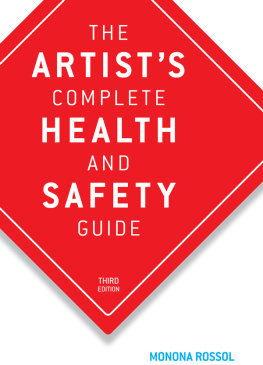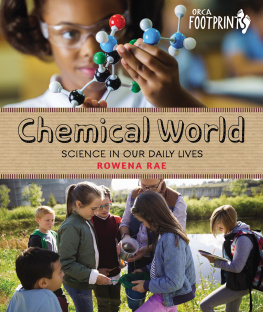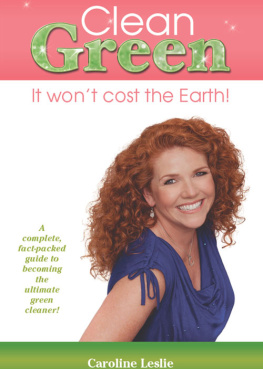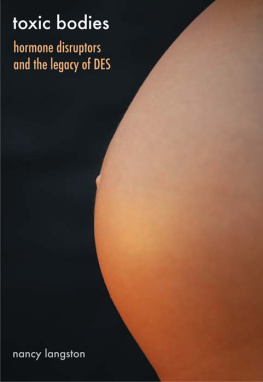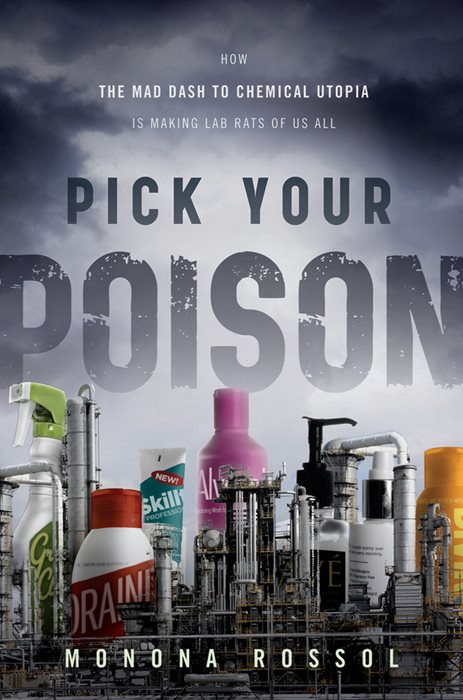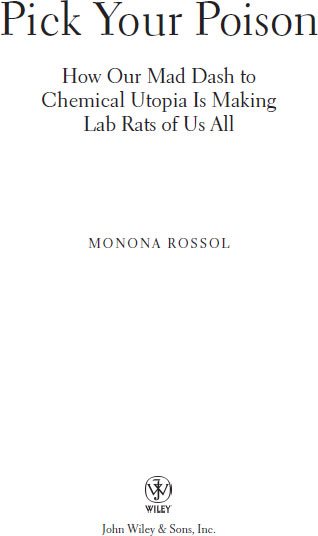Monona Rossol - Pick Your Poison: How Our Mad Dash to Chemical Utopia is Making Lab Rats of Us All
Here you can read online Monona Rossol - Pick Your Poison: How Our Mad Dash to Chemical Utopia is Making Lab Rats of Us All full text of the book (entire story) in english for free. Download pdf and epub, get meaning, cover and reviews about this ebook. year: 2011, publisher: Turner Publishing Company, genre: Religion. Description of the work, (preface) as well as reviews are available. Best literature library LitArk.com created for fans of good reading and offers a wide selection of genres:
Romance novel
Science fiction
Adventure
Detective
Science
History
Home and family
Prose
Art
Politics
Computer
Non-fiction
Religion
Business
Children
Humor
Choose a favorite category and find really read worthwhile books. Enjoy immersion in the world of imagination, feel the emotions of the characters or learn something new for yourself, make an fascinating discovery.

- Book:Pick Your Poison: How Our Mad Dash to Chemical Utopia is Making Lab Rats of Us All
- Author:
- Publisher:Turner Publishing Company
- Genre:
- Year:2011
- Rating:5 / 5
- Favourites:Add to favourites
- Your mark:
Pick Your Poison: How Our Mad Dash to Chemical Utopia is Making Lab Rats of Us All: summary, description and annotation
We offer to read an annotation, description, summary or preface (depends on what the author of the book "Pick Your Poison: How Our Mad Dash to Chemical Utopia is Making Lab Rats of Us All" wrote himself). If you haven't found the necessary information about the book — write in the comments, we will try to find it.
Did you know that nontoxic usually means never tested? Or that many green cleaners are good for the environment but terrible for you? Chemist and activist Monona Rossol goes from under your sink to the halls of the powerful, tracing Americas love affair with chemicals that kill, explaining how much worse the problem has gotten in the last decade. Shocking and appalling and completely reckless-thats how she describes the current prevalence of harmful chemicals in our everyday lives. Scientists have started linking our increased rates of cancer, autism, obesity, and asthma (among others) to chemical exposure and Rossol points the finger directly at the companies and executives making millions of dollars by polluting our environment and introducing toxic chemicals into our bodies. She chronicles how everyday toxins get into our bodies and accumulate over time and provides us with inspiration to make changes at the checkout lines. She also explains that Americans are not nearly as well protected by our government as we might think we are. Unlike the European Union, the United States allows chemical companies to produce toxins for use in U.S. consumer products with little to no oversight. While her tone is wry and entertaining, shes also well informed, and her fact-filled treatise makes for absolutely terrifying reading.
Includes surprising explanations about the chemicals in furniture, detergents, paints, makeup, toys, spray cleaners, ionic air purifiers, art supplies, and more
Reveals how many eco-friendly products are good for the environment but bad for your health
Exposes the truth about government regulations, product testing, and labeling, including why terms such as nontoxic (which often means never tested), hypoallergenic, and FDA-approved can be misleading
Offers practical ways to reduce your exposure and protect yourself and your family
If youre alarmed by the health risks of the many hazardous chemicals we encounter at home, work, and school, dont get frightened, get informed. Read Pick Your Poison to learn the facts and find out what you can do about the daily onslaught of toxins that are making lab rats of us all.
Monona Rossol: author's other books
Who wrote Pick Your Poison: How Our Mad Dash to Chemical Utopia is Making Lab Rats of Us All? Find out the surname, the name of the author of the book and a list of all author's works by series.

